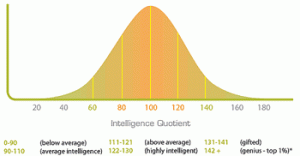 Initially, Alfred Binet created IQ tests in 1905, to determine whether children were smart enough to benefit from schooling. Since Binet’s first assessments, IQ tests have been updated and revised several times and educators have become much more sophisticated in their use. Now, the goal of IQ tests is to measure mental ability using a range of categories such as verbal abilities, visual-spatial reasoning , memory and speed of processing. Children taking IQ tests are provided with a number depending on how they rank against their age group, which signifies whether they are considered gifted, average, or at risk of learning and behavioural issues.
Initially, Alfred Binet created IQ tests in 1905, to determine whether children were smart enough to benefit from schooling. Since Binet’s first assessments, IQ tests have been updated and revised several times and educators have become much more sophisticated in their use. Now, the goal of IQ tests is to measure mental ability using a range of categories such as verbal abilities, visual-spatial reasoning , memory and speed of processing. Children taking IQ tests are provided with a number depending on how they rank against their age group, which signifies whether they are considered gifted, average, or at risk of learning and behavioural issues.
Some of the benefits of IQ tests are that children who are intellectually gifted can benefit from an early entry to kindergarten, special curriculum planning within kindergarten, or a uniquely enriched preschool environment. In addition, conditions like small muscle coordination and perceptual skills are less easily detected by observation. Moreover, test scores also give parents either confidence in their personal observations or the chance to correct their expectations appropriately.
 In an ideal world, we would be able to measure a child’s intelligence clearly and without variables; however, just as the child’s body changes dramatically over time, so can their level of intelligence. Evidence has shown that it is normal for a child’s IQ score to fluctuate when they are still developing, making it difficult to determine how reliable their score really is. In addition, variables such as distractions, anxiety , and stress are not taken into consideration in this score system and may have a direct effect on the child ‘s success on any given day. Moreover, research indicates that labels of all sorts are harmful to children which can have a drastic impact on future behaviour. Lastly, it is a fact that children who believe their intelligence is fixed are more likely to experience lower self-confidence, avoid challenges, and allow the label to speak for itself.
In an ideal world, we would be able to measure a child’s intelligence clearly and without variables; however, just as the child’s body changes dramatically over time, so can their level of intelligence. Evidence has shown that it is normal for a child’s IQ score to fluctuate when they are still developing, making it difficult to determine how reliable their score really is. In addition, variables such as distractions, anxiety , and stress are not taken into consideration in this score system and may have a direct effect on the child ‘s success on any given day. Moreover, research indicates that labels of all sorts are harmful to children which can have a drastic impact on future behaviour. Lastly, it is a fact that children who believe their intelligence is fixed are more likely to experience lower self-confidence, avoid challenges, and allow the label to speak for itself.
IQ tests can be a great way to examine particular aspects of a child ‘s intellect, but ultimately they don’t look at the whole picture. Intelligence tests should not be fixed to a one-size-fits-all mentality. They need to look at the overall pattern of strengths , weaknesses, environment and culture. Parents and teachers should consider using programs that focus on qualitative learning and overall potential, not just quantitative scores, to overcome the number of problems that come with IQ testing for children. Rather than determining what their level of intelligence is based on a few fixed categories, evaluations should focus on how a child learns, and on what educational tools they best respond to. Tests and evaluations should provide next steps in order for a child to achieve the best results they can, and help create a program specific to the needs of the child.
REFERENCES:
http://www.sylviarimm.com/article_intelligence.html
https://www.oxfordlearning.com/whats-the-score-problems-with-iq-tests-for-kids/
https://giftedsupportcenter.com/iq-tests-and-your-child/

